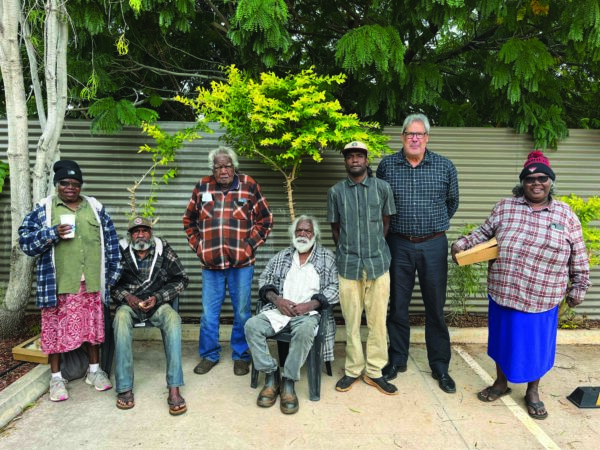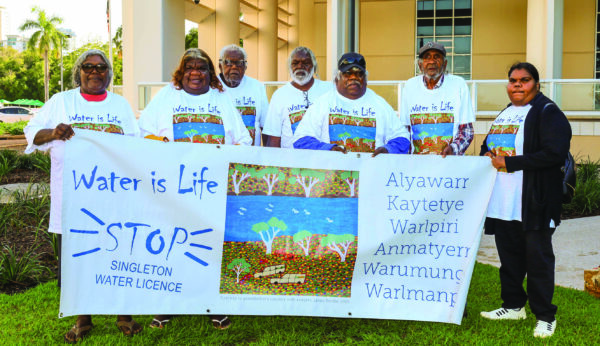A Land Rights News article

The native title holders and other traditional owners threatened by the massive Singleton Station water licence have asked the Central Land Council to take their fight for their water rights to Australia's highest court.
Meeting with the CLC's chief executive Les Turner in Tennant Creek, they said they want to start legal action in the High Court in Canberra as soon as possible.
The CLC agreed to represent the Mpwerempwer Aboriginal Corporation in its case against the 40 gigalitre licence – the largest amount of water the Territory has ever given away free of charge.
The desert region's native plants, animals and sacred water sites depend
on this groundwater.
"I am worried about this station," elder Ned Kelly told the meeting. "This Mpwerempwer is a powerful place. It covers all this area. It is a powerful story there."
He is counting on the CLC to help the native title holding body for the station, to continue its long fight against the licence.
"CLC that's the only way we can get it, they are fighting for us. We have to keep on fighting."
"They have said many times that they will never stop fighting against the licence that threatens their sacred sites and their communities' water security," CLC chief executive Les Turner said.
"So we'll consider all avenues open to them now."
The native title holders also decided to take part in an assessment of the environmental impact of the company Fortune Agribusiness' plans to grow fruit and vegetables for overseas markets.
The NT Environmental Protection Agency will check whether the company's plans to protect dozens of sacred sites, hunting and gathering grounds and other important stories and places on Singleton are good enough.
Before that assessment is finished, the company is not allowed to use the licence to extract groundwater.
The native title holders hope that, if the agency investigates properly, it will see that the damage from the licence will be too big and the NT government will deny the company the environmental approvals.
Mr Kelly's grandson Brian believes the stakes are simply too high to leave any stone unturned.
"If this goes ahead, there will be nothing there when we go look around," he said.
"We need to think about future generations," elder Michael Jones said, reminding everyone that remote communities in the region have struggled for water before.
"We moved to Alekarenge because there was no water. Old people carted water from Seven Mile to town. We don't want that to happen to our next generation. Where will our young ones go?"
Mpwerempwer's decision not to give up comes after the NT Supreme Court dismissed its appeal against the licence.
The judges ruled in May that the NT government did not have to follow the Western Davenport Water Allocation Plan when it gave the licence and that it can leave important regulations for later.

They also said the government did not need to talk to Mpwerempwer and the CLC about sacred site protection conditions in as much detail as it talked to the company about those conditions.
A High Court appeal against this decision and the EPA assessment are not the only things on the minds of the traditional owners.
Mr Jones is worried that the new Territory Coordinator, an unelected NT bureaucrat with vast powers, could try to intervene.
"That Territory Coordinator, he won't listen to anyone. He doesn't need to talk to anyone, doesn't need to talk to traditional owners," he said.
The Territory Coordinator has to consider economic development before everything else.
Fortune Agribusiness has promised to create lots of jobs and money for the NT, but experts say these claims are greatly exaggerated.
More than five years after the traditional owners first spoke up against the Singleton water licence, their battle continues.
This is an article from Land Rights News July 2025. Read the full paper here.






